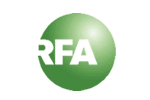 Radio Free Asia (RFA) is a private, non-profit news organization, operating under a grant from the BBG, broadcasting daily in nine languages to listeners in Asia whose governments restrict media. RFA broadcasts accurate and timely news and information, along with a range of voices and opinions from within Asia, to demonstrate freedom of expression over the airwaves and online.
Radio Free Asia (RFA) is a private, non-profit news organization, operating under a grant from the BBG, broadcasting daily in nine languages to listeners in Asia whose governments restrict media. RFA broadcasts accurate and timely news and information, along with a range of voices and opinions from within Asia, to demonstrate freedom of expression over the airwaves and online.
RFA focuses on news and features of unique and specific relevance to its target areas. Through shortwave, medium wave, satellite transmissions and the Internet, RFA broadcasts in Mandarin, Cantonese, Uyghur, three dialects of Tibetan, Burmese, Vietnamese, Korean, Lao, and Khmer. Headquartered in Washington, D.C., RFA has seven overseas bureaus and a vast network of stringers around the world. Call-in programs and multimedia websites provide listeners and readers with a forum in which they can express views and exchange ideas.
Following strict journalistic standards of objectivity, integrity and balance, RFA serves as a model for its target countries’ emerging journalistic traditions. Reaching Asian listeners from all social strata and maintaining credibility are RFA’s top priorities. RFA’s breaking news coverage has been singled out as authoritative by major media including The Wall Street Journal, Reuters, AFP, NHK, and numerous others. ”
Fast Facts
- Employees: 267
- FY2009 Budget: $37.4 million
- Weekly Hours Broadcast: 287
- Languages: 9
Highlights
Burma
The Burmese Service broke a continuous string of stories related to changes happening within Burma throughout the year, as the nominally civilian government made unprecedented overtures to implement long-sought human rights and free speech reforms. Notably, the service aired exclusive remarks by the country’s powerful censorship chief saying he would like to abolish restrictions on the press.
China
The Mandarin Service covered Beijing’s dramatic upward spike of detaining citizens, petitioners, and human rights lawyers and activists, arresting bloggers, harassing foreign journalists, barring independent candidates from running for local office, and implementing harsher restrictions on state-controlled media and the Internet. These collective measures were largely viewed as a nationwide crackdown in response to the revolutions that swept through countries in northern Africa and the Middle East. The Tibetan Service provided extensive coverage of tensions and events stemming from a standoff between armed police and monks at the Tibetan Buddhist Kirti monastery in the Chinese province of Sichuan. These included the more than a dozen self-immolations of Buddhist monks and nuns throughout the Tibetan regions in protest of Beijing’s rule. The service also covered the 2011 election of the Tibetan exile government, holding live candidates’ forums and being first to interview Prime Minister Lobsang Sangay immediately after he was declared the winner of the race. The Cantonese Service presented a 10-part broadcast report and online video series on pollution of China’s Dong River, a primary source of drinking water for 50 million people in southern China. The service, along with RFA Mandarin, also reported on protests and unrest in Inner Mongolia as people demonstrated en masse against Chinese rule and the environmental degradation of the region’s grasslands. The Uyghur Service reported on the continuing unrest in Urumqi and throughout China’s northwest Xinjiang Uyghur Autonomous Region, and Beijing’s targeting of ethnic Uyghurs through anti-terrorism rules and laws. The service exclusively covered instances of China exerting pressure on outside countries to extradite Uyghur refugees seeking asylum.
Korea
The Korean Service covered a series of moves strongly indicating the succession of power from North Korean dictator Kim Jong-Il to his son, Kim Jong Un. In addition, the service reported on the North’s nuclear program, and its sword rattling with neighbor South Korea that led to an exchange of artillery fire in August.
Cambodia
The Khmer Service provided comprehensive coverage of the UN-backed Cambodian trial of former Khmer Rouge officials, broadcasting the proceedings as well as interviewing rights groups representatives, victims’ families, and ordinary citizens. The service also covered illegal logging in the country’s rainforests and resulting protests against deforestation and government corruption.
Laos
The Lao Service covered the progress and delays regarding the construction of the controversial Thai-sponsored Xayaburi Dam on the Mekong River. The project, temporarily halted, would have severe repercussions for local communities and economies that depend on the Mekong.
Vietnam
The Vietnamese Service provided coverage of the ongoing disputes between the government and Vietnamese Catholic church parishioners. In January, the service broke the news of a U.S. embassy official being beaten and turned away by police in an attempt to meet Vietnamese dissident Father Nguyen Van Ly, who is under house arrest.
Earlier Highlights
Awards
At the 2011 New York Festivals® broadcast awards, RFA’s Korean Service won a gold medal for a piece titled, “New Year Celebrations Thousands of Miles from Home.” The program aired in February, featuring interviews with North Korean defectors living around the world as they reminisced about the families, friends, and lives they left behind.
For more information about RFA, click here.














